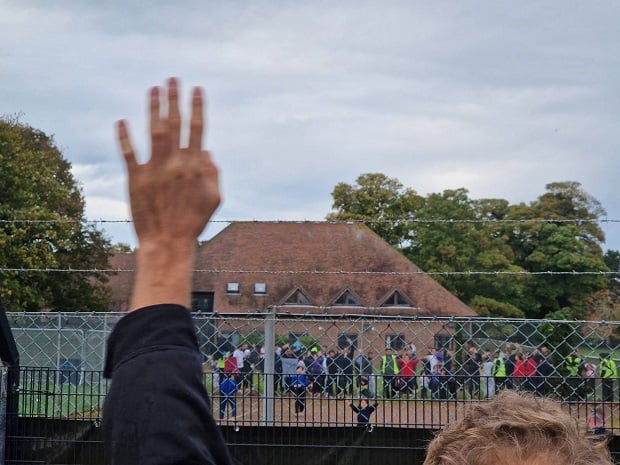
A report published today (November 1) by the HM Chief Inspector of Prisons following an inspection of Manston processing centre in July shows that issues of extended detention for adults and children, people sleeping on floors and detainees with disabilities and trafficking victims not being designated as adults at risk were already present before the overcrowding crisis.
The report outlines a list of 14 concerns with the first six said to need ‘priority’ treatment.
Amongst those concerns was the failure to designate people with disabilities and trafficking victims as adults at risk, detained people not being allowed to fully close toilet doors, children held for up to 48 hours and a lack of overall leadership – a point previously highlighted in a Prison Officers Association podcast.
The concerns listed for Manston are:
- Exhausted detainees were regularly held for more than 24 hours in non-residential accommodation.
- Professional interpretation was used inconsistently, with the exception of the screening interview.
- Governance of health care processes was weak. Medevent’s management of controlled drugs was particularly poor and breached standards for the safe storage of medicines. The care pathway lacked coordination or clinical leadership and there were no policies, protocols or governance of clinical standards.
- Detainees’ vulnerability was not always recorded to inform subsequent assessments. Detainees with disabilities and trafficking victims were held at Manston, but no detainees had been designated as adults at risk.
- Some children were detained for too long. The documented average length of detention for unaccompanied children was 27 hours and the longest was 48 hours.
- The governance of security clearances and training of staff at Western Jet Foil and Manston sites was weak. There was no single co-ordinated database of the security clearance or disclosure and barring service (DBS) status of all staff working on the sites and it was not possible to determine if all staff had had undergone relevant checks or appropriate training to work with children and vulnerable adults.
- Data collection was inconsistent and fragmented. The total length of detention from arrival at WJF to departure from Manston was not recorded and data on the number of referrals made to the National Referral Mechanism were not consistent or complete.
- The lack of single leadership oversight and consistent coordination of agencies at Manston and between Manston and the other sites presented risks to the vulnerability and welfare of detainees.
- Detainees were searched too many times and not always with sufficient sensitivity by Home Office staff.
- Mitie Care and Custody induction interviews were held in noisy booths where staff and detainees struggled to hear and understand each other, and interpretation was not always used where needed.
- Records did not adequately show whether the use of force and restraints were proportionate.
- Detainees at the screening building were not allowed to use toilets in private.
- .Detainees did not have adequate access to phones. A stock of mobile phones at Manston were not routinely offered and some detainees’ request for a phone was refused with no explanation.
- Detainees were given very little information about the next steps when leaving Manston.
The report says 40 children had been held at the site between April and June with five of those unaccompanied. It adds: “The documented average length of detention for unaccompanied children was 27 hours and the longest was 48 hours, which was far too long. At the time of the inspection, the temporary closure of WJF resulted in more people than usual being held at Manston pending age assessments. They had to wait for up to 12 hours to see social workers.”
The report highlighted staff treating people with sensitivity but said some practices were unnecessary.

It said: “At Manston, the marquees were clean, well ventilated, in good condition and comfortable for short stays. However, a lack of trained Mitie staff to supervise other marquees meant that adult males were crowded into a single facility and exhausted detainees slept on floor mats between the rows of chairs.
“They were not allowed to go into the fresh air despite some very lengthy stays. Toilets and showers in most of the marquees were in good condition, but the baby changing facility was in a dirty mobile toilet. Sanitary products were freely available in the Mitie holding areas only. Detainees at the screening building were not allowed to use toilets in private, which was undignified and unnecessary.”
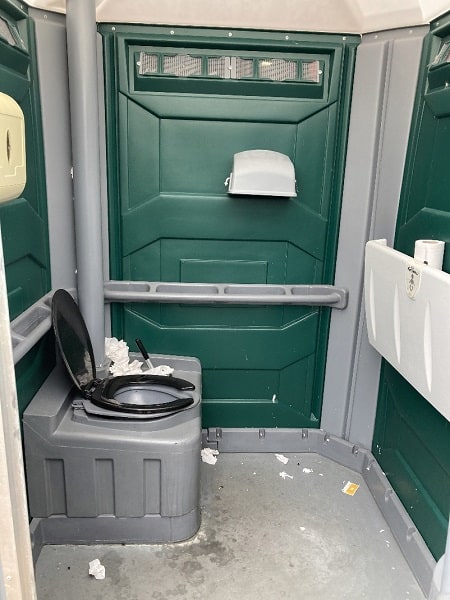
The inspector did note that there was a good stock of clothes for detainees and children and property was stored safely and there was “good staff engagement in the children and families’ marquee” but added: “Adequate food was provided, but hot meals consisted largely of unhealthy fried food that did not meet all dietary requirements. In the Mitie marquees at Manston, there were plenty of freely available cold snacks and drinks.”
Staffing numbers were also noted in the report: “There had been considerable leadership efforts to increase the number of staff, but this remained a problem that was directly affecting detainee care at Manston. For example, while some marquee accommodation was overcrowded, other marquees were unused because of a lack of trained detention staff.”
The Inspectors said Home Office data did not show any designated adults at risk despite trafficking victims and other vulnerable adults passing through the centre.
The report says: “Home Office data showed that no detainees had been designated as adults at risk at Manston despite individuals with significant health issues and experience of trafficking passing through the facility. This resulted in potentially critical information about vulnerability not being made clear to decision-makers at subsequent stages of the asylum process.
“The Home Office was not able to provide consistent data on the number of referrals to the National Referral Mechanism (NRM, see Glossary) that had been made from Manston. During our inspection, we were given several different figures and agency staff who conducted asylum screening interviews told us that these were all much lower than the number of referrals they recalled making.”
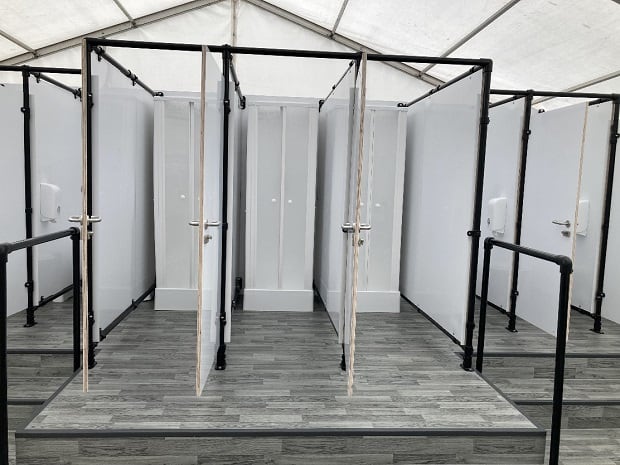
At the time of the inspection in July tensions had not risen to current levels and use of force interventions was low.
The report notes: “There had been four recorded uses of force at Manston since the site became operational, two involving Mitie staff and two Border Force staff.
“Records gave an account of events but did not adequately justify the proportionality of the force used or the use of handcuffs. In one case, there was no risk assessment to justify the use of handcuffs when escorting a sick detainee to hospital. In another, it was unclear why a detainee remained in handcuffs for 10 minutes after being removed from the scene of an altercation with another detainee.”
Levels have since risen with the POA saying last month that in one 24 hour period 17 instances of ‘use of force interventions’ were recorded. In a prison setting six such incidents in that timeframe would raise red flags.
POA Assistant General Secretary Andy Baxter said “Manston is the largest single site of detention in the UK, holding over 3000 people. There is no prison in the UK that accommodates that many people. The areas operated by our members are stretched to the limits, frustration is rising and the POA members on site are working flat out to keep the peace in their section of the operation. However tensions are starting to mount in other sections of the site.”
He said there are concerns that detainees could overpower staff and real concerns over staff welfare.
He said staff are ‘overstretched’ and there are health risks with “a facility as large as this with an unknown population, with unknown medical conditions.”
Manston’s family marquee area was highlighted as ‘welcoming’ and offered a good range of toys and activities for children of all ages and inspectors saw staff playing with the children. Adult men in the other marquees had access to board games, cards and DVDs and staff were participating in this with them.
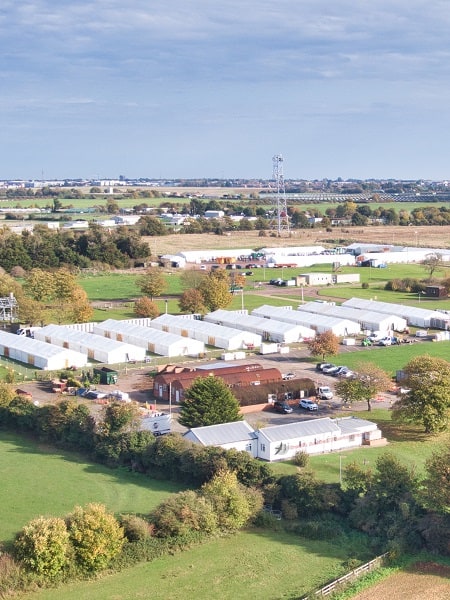
The prison inspector’s report also found some people were being sent to hotels without proper screening being carried out.
The report says: “Home Office data showed that screening interviews were carried out with most detainees while they were at Manston. However, a considerable minority were bailed to temporary hotel accommodation without screening. This was more common during busy periods. The Home Office was not able to provide data on the number of people who were screened at Manston and the number who left the site unscreened.”
The inspection also backs claims of a whistleblower, reported in The Isle of Thanet News yesterday, who said untrained staff were having to step into other roles.
The report says: “We did not see any interaction at Manston between Interforce staff and detainees during the initial processing stages. Interforce staff said the purpose of their role was to guard the detainees. Staff did not engage with detainees and used numbers instead of detainees’ names.
“We were told that recruitment issues at Mitie had resulted in Interforce staff with no detention training managing some of the marquees during busy periods.”
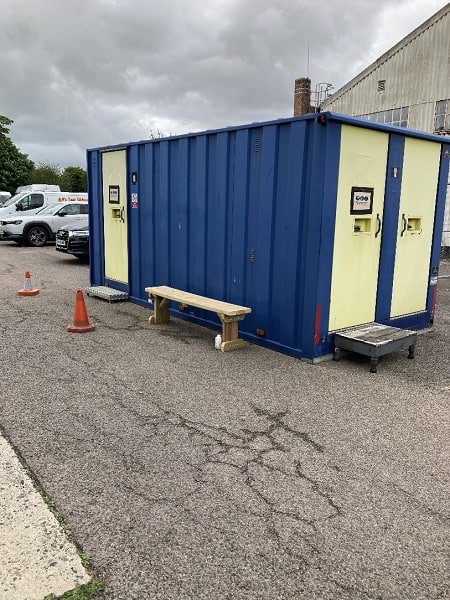
Health care was also noted as having some ‘poor’ areas and was carried out by paramedic services, Medevent staff and paramedic staff from IPRS Aeromed. There is no mention of a 24/7 GP despite Home Office claims that this is the case despite the POA saying that service was due to begin today (November 1).
The report adds: “Facilities for the management of detainees with COVID or other infectious diseases were poor. Detainees were placed in a claustrophobic portacabin with no clear responsibility assigned for managing their care. Paramedic staff were unsure of any guidance, policy or procedure for the management of infectious diseases.” Manston has had cases of diphtheria and scabies and one instance of MRSA has also been reported in the Guardian.
The report notes people were not informed of legal rights and signs with information were only in English. There were no records of visits to the site by legal representatives.
Since the inspection conditions at the centre have deteriorated for both people held there and staff.
By Sunday those held at the site reached some 4,000 people following a petrol bombing incident at the Dover centre which resulted in 700 people being bussed from there to Manston. It is designed to hold between 1,000 and 1,500 people.
A whistleblower also claimed “weapons are being made on site” – a claim denied by the Home Office but made by several other sources to national media this week.
Calls for site to be shut down
Manston is a concentration camp.
Interning people there illegally is a political decision taken by Suella Braverman and the Home Office.
The childrens’ cries of “freedom” and “we need your help” are a haunting indictment of the barbaric British border regime. https://t.co/PZzR3PH2Yc
— SOAS Detainee Support (SDS) (@sdetsup) October 31, 2022
An organisation that works with people detained in immigration detention says it believes “Manston is a concentration camp…interning people there illegally.”
SOAS Detainee Support is one of the member groups of Action Against Detention and Deportations (AADD).
The AADD went to Manston on Sunday and says members “witnessed children screaming “we need your help” from within the confines of the overcrowded camp.”
A spokesperson said: “Across a barbed wire fence we asked people where they were from, and they shouted Iran, Afghanistan, Syria, Pakistan, and Sudan. They told us they have been detained in the ‘temporary’ camp for as long as 30-40 days, under horrendous conditions: no access to lawyers, telephones or doctors. Detained people told us “we’re getting sick” and life in the camp was “not good”.
“The camp is already overcrowded – and we saw hundreds more people arriving on coaches and buses, wrapped in blankets, exhausted and spent. Thirteen full coaches arrived at the camp over the course of just three hours. Only one coach with a handful of people, including security personnel, left during that time.
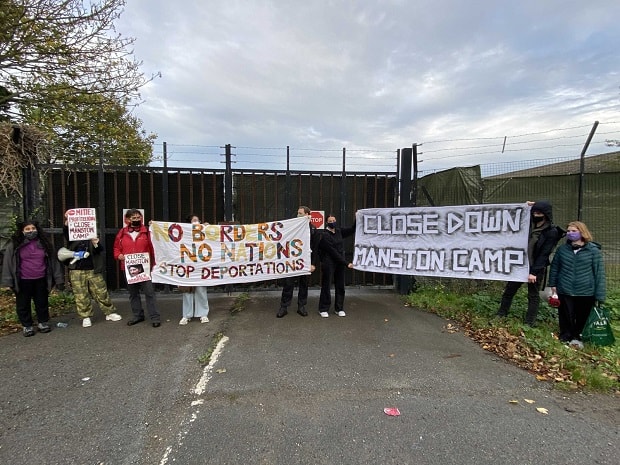
“AADD saw piles of blue plastic bags with identification tags, containing the belongings confiscated from the detained people upon arrival.
“AADD believes Manston is a concentration camp, and that interning people there illegally is a political decision taken by Suella Braverman and the Home Office.
“This is a life threatening situation. Unless people are moved into safe accommodation immediately, lives will be lost from a highly contagious disease or neglect. People arriving at this camp have fled war, persecution, poverty and climate breakdown. How many are women and children traumatised by rape and other torture? People have the right to settle and to claim asylum and protection in the UK.
“The government is breaking international law and any humane standard by imprisoning people, including children, in these conditions. The children’s cries of “freedom” and “we need your help” are a haunting indictment of the British border regime.”

County Councillor Karen Constantine said conditions at the centre are “shaming Kent.”
She said: “This detention facility at Manston has been wilfully shrouded in secrecy. Now we know – to our shame – that more than 4000 people, including many mothers, fathers children and babies from Syria, Iraq, Afghanistan, Pakistan, Albanian and elsewhere are being held at there in appalling, hostile and degrading conditions.
“We know that their health is hugely compromised, with scabies, MRSA, tuberculosis and diphtheria outbreaks. Recent news and social media reports show people asking – pleading – for help and freedom.
“It would seem there is little prospect of change, given that an FOI by the IPPR to the Home Office last week reported 7,500 outstanding asylum claims from small boat arrivals were waiting at least a year for an initial decision. Nor will our Government take urgent action to ensure people are provide with more suitable accommodation. It seems their human rights are being trampled upon.
“This situation is untenable and inhumane. It is shaming for Kent.”

Home Secretary Suella Braverman has come under increasing fire over the situation at Manston.
North Thanet MP Sir Roger Gale has told national media that either the previous Home Secretary or Ms Braverman need “to be held to account” for decisions which have led to “a breach of humane conditions.”
Last December MP Sir Roger said the proposed site at the former fire training and defence centre was “inappropriate” and would have “unfortunate and undesirable consequences for the communities and the people affected and the government.”
In Parliament yesterday Suella Braverman said she will visit Manston “shortly.” She told Parliament it was “practically impossible” the procure 1,000 beds at short notice but the Manston site has been expanded.
She also acknowledged: “We need to meet our statutory duties around detention and also fulfil legal duties around those who would otherwise be destitute.”
She said more than 9,000 people have left Manston since September 6, when she became Home Secretary.
She added people travelling from “safe countries” are “not welcome.” She said the government is “resolute” on making “illegal” entrance to the UK “unviable” branding the crossings “an invasion” which has created a backlash and accusations of stirring up hate.
The Home Office has welcomed the report and says “considerable improvements to the infrastructure and processes in place to accommodate record numbers of people arriving in the UK illegally via small boats” have been made snce the July inspection.
A Home Office spokesperson said: “The number of people arriving in the UK via small boats has reached record levels and continues to put our asylum system under incredible pressure.
“Manston remains resourced and equipped to process migrants securely and we will provide alternative accommodation as soon as possible.
“We urge anyone who is thinking about leaving a safe country and risk their lives at the hands of vile people smugglers to seriously reconsider.
“Despite what they have been told, they will not be allowed to start a new life here.”
It is reported there will be a large number of removals from the site today (November 1).
Channel crossings
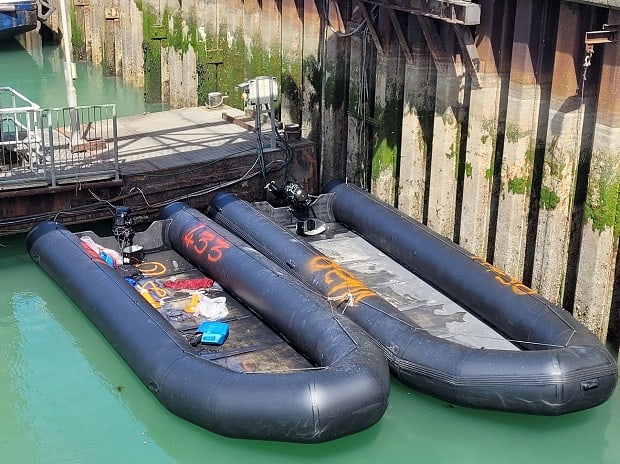
Recorded small boat Channel crossings show just under 40,000 arriving in the UK so far this year. In 2021, it was 28,526 people and in 2020 it was 8,404.
The processing centre at MoD Manston, on the site of the former fire training school, was ready in January and operational by February this year.
The Home Office planned for 1,000 to 1,600 people passing through each day and checks to be completed in 24 hours.
The cost of people seeking asylum being housed in hotels is currently £5.6m per day. This does not include accommodation for Afghan families which is an additional £1.2m per day, the Home Affairs Committee was told last week.
A vigil demanding the Manston centre is shut down will be held on Wednesday at 7pm, meeting by the Manston Spitfire Museum car park. Members of SOAS will join local demonstrators.

